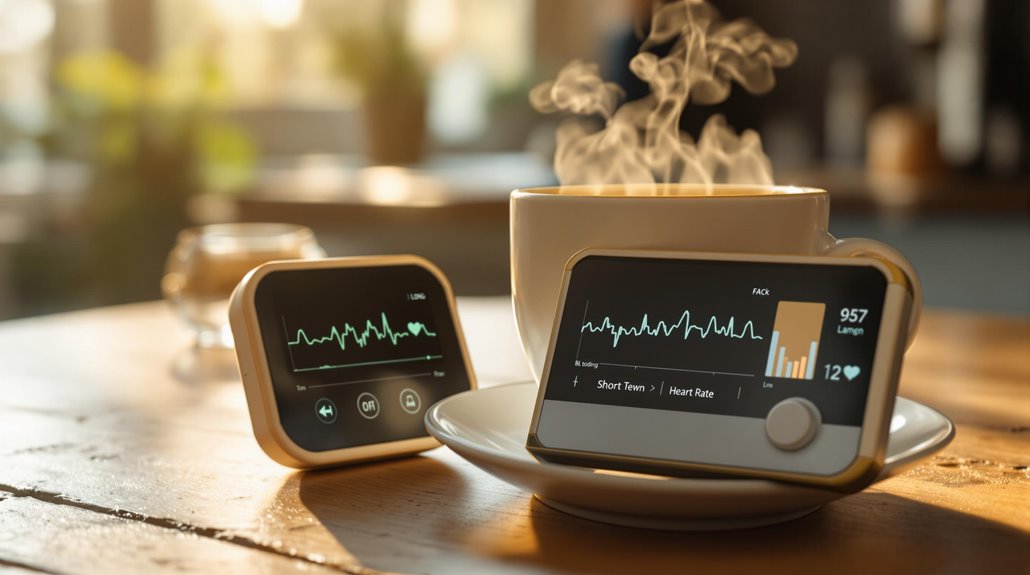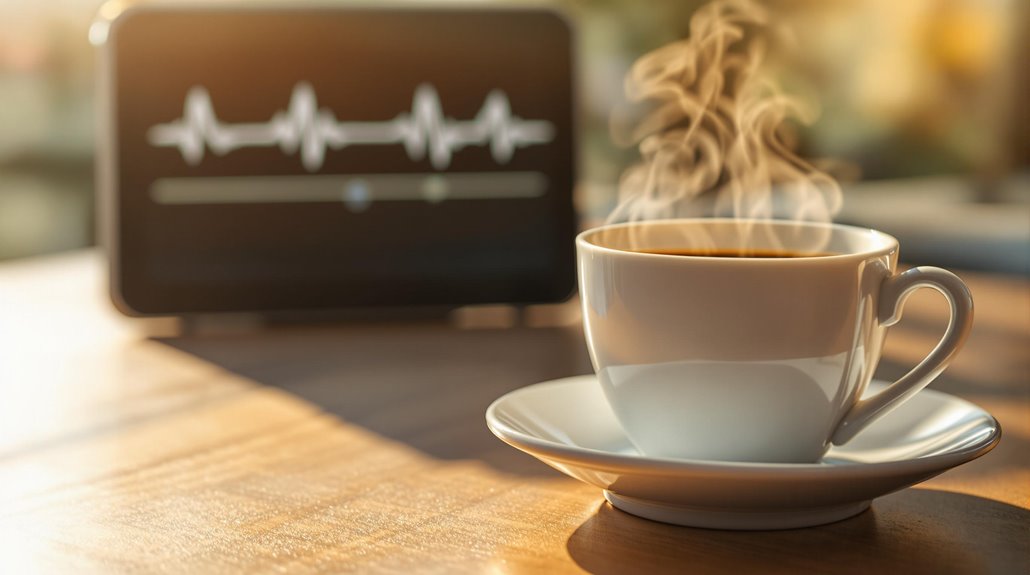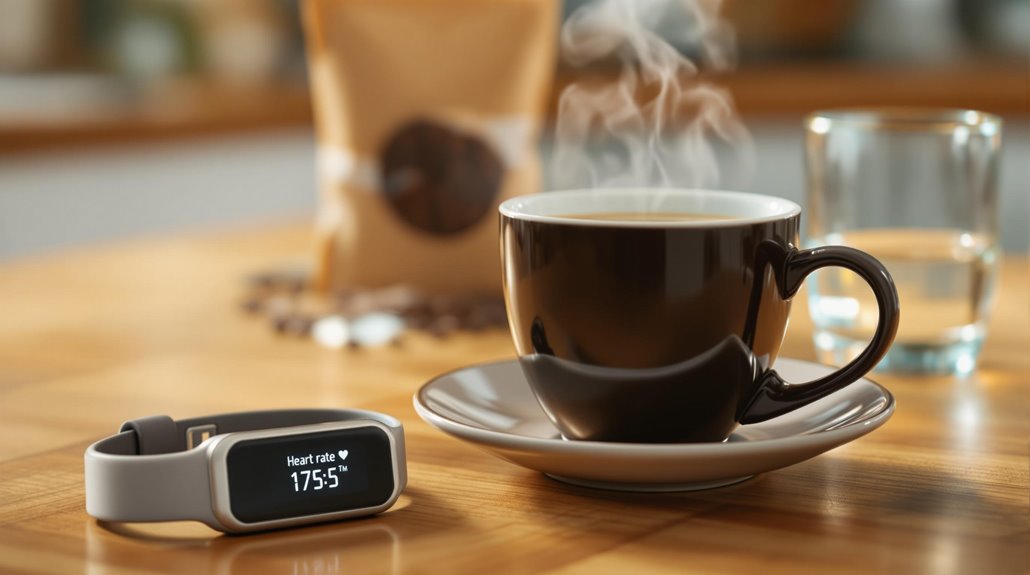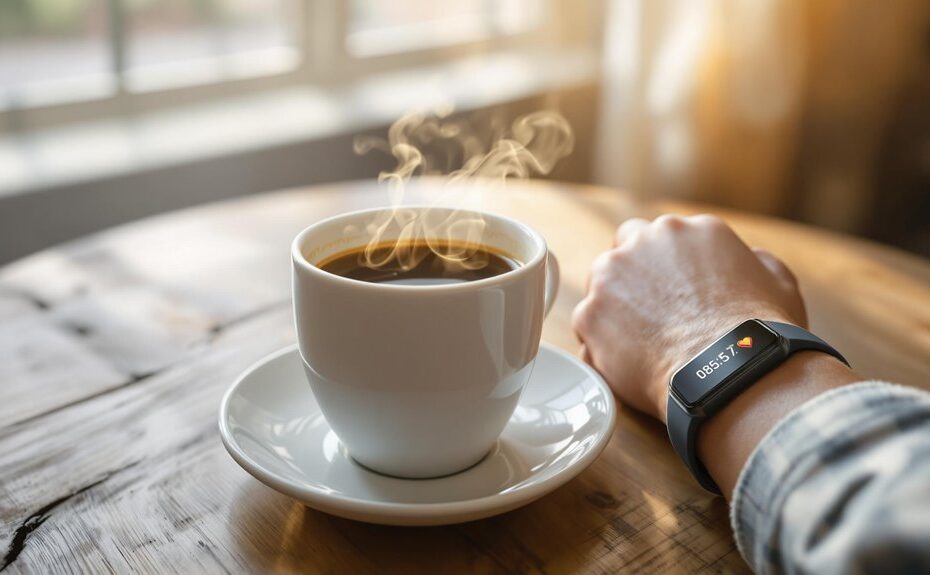





Imagine you've just finished your morning coffee, and suddenly, you notice your heart beating faster than usual. This isn't uncommon—caffeine, the active ingredient in coffee, stimulates your nervous system, which can temporarily raise your heart rate. But how much of an effect does it really have, and could it pose risks over time? The answer isn't as straightforward as you might think, especially when factors like dosage, tolerance, and individual sensitivity come into play. What happens if you drink too much, or if you're someone with a preexisting heart condition? The details might surprise you.
Key Takeaways
- Coffee increases heart rate by 3-5 bpm within 15-45 minutes due to caffeine blocking adenosine receptors.
- Higher caffeine doses (400+ mg) cause more significant heart rate spikes, peaking within 1-2 hours after consumption.
- Short-term heart rate effects subside as caffeine is metabolized, but long-term tolerance reduces its impact over time.
- Excessive caffeine (over 400 mg/day) can elevate heart rate, increasing risks of tachycardia and atrial fibrillation.
- Factors like genetics, age, and pre-existing heart conditions influence how strongly coffee affects heart rate.
How Caffeine Affects Heart Rate
Caffeine directly impacts heart rate by blocking adenosine receptors, which typically promote relaxation and slow heart rate. When you consume caffeine, it inhibits adenosine's calming effects, leading to a temporary increase in heart rate by 3-5 beats per minute (bpm). A standard cup of coffee, containing 95-200 mg of caffeine, can cause your heart rate to peak within 1-2 hours after ingestion. Higher doses, such as 400+ mg of caffeine, may result in more pronounced heart rate spikes, particularly if you're not accustomed to regular caffeine consumption.
Over time, your body may develop tolerance to caffeine, reducing its acute effects on heart rate. However, chronic intake of 400 mg or more per day can still lead to an elevated heart rate, especially if you're a nonhabitual consumer. This sustained elevation may contribute to increased cardiovascular strain. The relationship between caffeine and heart rate is dose-dependent, meaning the more caffeine you consume, the greater the potential for an elevated heart rate. Monitoring your intake and understanding your body's response to caffeine can help you manage its effects on your cardiovascular system.
Short-Term vs. Long-Term Heart Rate Effects

Short-term caffeine consumption can lead to a noticeable but temporary increase in heart rate, typically rising by 3-5 beats per minute within 15-45 minutes of ingestion. This effect is more pronounced with higher doses, such as 400+ mg, where heart rate may spike substantially within 1-2 hours. These short-term heart rate changes occur because caffeine blocks adenosine receptors, stimulating the release of adrenaline and temporarily boosting cardiovascular activity. However, these effects are transient and usually subside as caffeine is metabolized.
In contrast, long-term caffeine consumption often results in tolerance, diminishing its impact on heart rate over time. Regular users may experience minimal heart rate changes compared to those who consume caffeine infrequently. This adaptation occurs as your body becomes less responsive to caffeine's stimulatory effects. However, abruptly stopping caffeine after prolonged use can lead to withdrawal symptoms, including temporary heart rate fluctuations, as your body readjusts to the absence of the stimulant. Understanding these short-term and long-term heart rate effects helps clarify how caffeine interacts with your cardiovascular system over time.
Factors Influencing Caffeine's Impact on the Heart

Several factors can influence how caffeine affects your heart rate, including genetics, age, and lifestyle. Your genetic makeup determines how quickly your body metabolizes caffeine, which impacts the speed and intensity of heart rate elevation. Older adults and individuals with lower body weight often experience stronger effects due to increased sensitivity. Lifestyle choices, such as smoking, can also alter caffeine's impact; smokers metabolize it faster, potentially shortening its duration on your heart rate.
The caffeine content in your beverage matters too. Energy drinks, with their high levels of caffeine and added stimulants, may cause more pronounced heart rate spikes compared to coffee. Your nervous system's response to caffeine also plays a role, as it stimulates adrenaline release, temporarily increasing heart rate. Pre-existing heart health conditions or medications, like beta-blockers, can further modify this response, either amplifying or mitigating caffeine's effects. Understanding these factors helps you gauge how caffeine might influence your heart rate and overall heart health.
Risks of Excessive Caffeine Consumption

Exceeding 400 mg of caffeine daily can substantially elevate your heart rate, potentially leading to tachycardia, where it surpasses 100 beats per minute. High levels of caffeine, particularly above 500 mg/day, increase your risk of atrial fibrillation, a serious heart rhythm disorder. This risk is heightened if you have pre-existing heart conditions. Consuming more than 10 grams of caffeine in a short period can be fatal, causing severe heart rhythm disturbances and even cardiac arrest. Chronic high caffeine intake also raises your blood pressure and heart rate over time, contributing to long-term cardiovascular disease risks. Energy drinks, often containing 300+ mg of caffeine per serving, are particularly concerning. They can cause acute spikes in heart rate and trigger arrhythmias, especially in young adults. Monitoring your caffeine intake is essential to avoid these risks, as excessive consumption disrupts normal heart rhythm and places undue stress on your cardiovascular system. Limiting caffeine from all sources, including energy drinks, helps maintain stable blood pressure and heart rate, reducing the likelihood of adverse effects.
Tips for Managing Caffeine Intake and Heart Health

How can you effectively manage caffeine intake to support heart health? Start by gradually reducing your consumption, cutting back one cup of coffee or caffeinated beverage daily to avoid spikes in heart rate and withdrawal symptoms. Replace high-caffeine drinks with green tea, which contains 25-35 mg of caffeine per cup and provides heart-healthy antioxidants. Monitor your daily intake to stay within the FDA-recommended limit of 400 mg, as exceeding this can elevate heart rate and blood pressure, negatively impacting overall health. Incorporate 150 minutes of moderate physical activity weekly to boost energy naturally and reduce reliance on caffeine. Additionally, practice stress-reduction techniques like meditation or deep breathing to manage energy levels without increasing heart rate through caffeine. By balancing caffeine consumption with healthier alternatives and lifestyle habits, you can maintain stable heart rate and blood pressure while supporting your overall health.
Disclosure: As an Amazon Associate, I earn from qualifying purchases.




